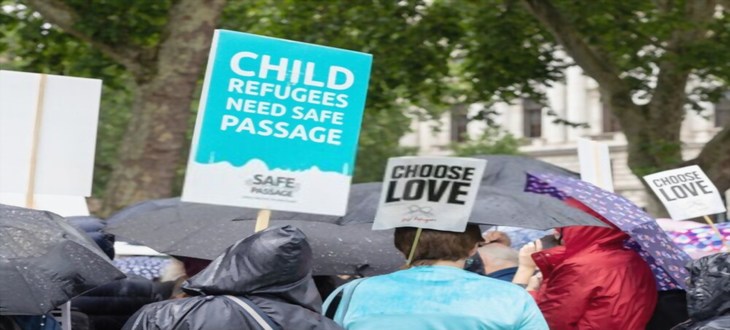The Home Office has been accused of backtracking on promises to reunite minor refugees with their families in the UK.
The EU family reunification rules will expire once the Brexit transition period ends on 31 December 2020, casting doubt on the future status of unaccompanied children refugees in France and even Greece.
Past Promises
The Home Office had vowed to reunify migrant children with UK-based families that had applied for reunification before the deadline. A year ago, while speaking in front of the British Parliament Prime Minister Boris Johnson was quite vocal about the issue.
The prime minister had stated that he was “absolutely committed to ensuring that this country will continue to receive unaccompanied minor refugees” once the UK left the European Union.
UK-based charities had also received multiple reassurances from the authorities that the UK would continue to unite families who had applied for reunification throughout the next year.
Present Crisis: Child refugees at Risk
The problem came to the limelight when the French authorities began informing refugee children and their families that they could no longer apply to reunite with their loved ones in the UK. The announcements were made a week after discussion sessions were held in the French interior ministry.
According to independent sources, the UK is still uncertain about how to process child refugees detained in the EU. Reports have now revealed that so far “no proper arrangements” have been made by the UK for the transfer of minor refugees under the family reunification Dublin agreement.
The Dublin Regulation was introduced to allow families who were separated in many different European countries to be reunited during their asylum claim.
The agreement especially protected the rights of minor refugees (children under 18) and awarded them a broad range of possibilities to reunify with families based in other European countries.
The controversial move to renege on the agreement is a pertinent one. It has implications for refugee children stuck in France as well as minors who are currently living in Greek refugee camps.
Home Office Stance
Meanwhile, the Home Office has dismissed these reports as baseless accusations. Speaking to the media about the issue, the Home Office spokesperson said:
“These claims are completely inaccurate. We are committed to continuing to process all family reunion cases, under the Dublin regulation, that entered the system before the end of the transition period. All EU member states can continue to make requests to the UK on the basis of family reunion and we will continue to assess and process these requests.”
“We have to help more people directly from the affected regions and that is exactly what we are planning with our new firm and fair asylum system, which will welcome people through safe and legal routes,” continued the spokesperson.
The Outcry
Unsurprisingly, the move has received criticism from many rights activists and charities working to reunite minor refugees with their families.
Beth Gardiner Smith, the chief executive officer of Safe Passage International, a charity that helps transfer refugee children from European countries to the UK remarked:
“Unaccompanied child refugees in Europe have been left with nothing more than broken promises and fading hopes of reuniting with family in the UK. It is devastating that children desperate to reunite with their family have been turned away because of government inaction and a failure in international cooperation.”
According to Smith, two families have already been informed that they cannot apply for reunification under the new policy. There are also 20 pending cases of unaccompanied children and five families who are eligible to apply for reunification under the Dublin Regulation but will be inevitably refused unless the circumstances change.
Need Immigration Advice?
For UK visas and immigration help, contact immigration experts at 4A Law






You must be logged in to post a comment.